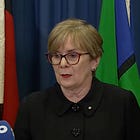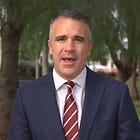Palestinian Authority Welcomes Australian Recognition, Demands Concrete Action
Today’s Article is brought to you by Empower your podcasting vision with a suite of creative solutions at your fingertips.
This piece is freely available to read. Become a paid subscriber today and help keep Mencari News financially afloat so that we can continue to pay our writers for their insight and expertise.

The Palestinian Authority welcomed Australia's formal recognition of Palestinian statehood Sunday but said the declaration must be backed by concrete action to help establish an independent state, as international legal experts said the move carries significant diplomatic weight despite Israeli and U.S. opposition.
Palestinian Authority Foreign Minister Varsen Aghabekian said recognition was essential for regional peace but represented only the beginning of a process requiring further international pressure on Israel.
"Believing that there can be peace and security in the region without the materialisation of an independent state of Palestine and the achievement of the inalienable rights of the Palestinian people is a delusion," Aghabekian said.
The Palestinian response came as Australia joined Canada and the United Kingdom in formally recognizing Palestinian statehood during the United Nations General Assembly, with France, Belgium and Portugal expected to follow.
Truth matters. Quality journalism costs.
Your subscription to Mencari directly funds the investigative reporting our democracy needs. For less than a coffee per week, you enable our journalists to uncover stories that powerful interests would rather keep hidden. There is no corporate influence involved. No compromises. Just honest journalism when we need it most.
Not ready to be paid subscribe, but appreciate the newsletter ? Grab us a beer or snag the exclusive ad spot at the top of next week's newsletter.
Palestinian Authority Seeks Support
Aghabekian outlined specific areas where recognizing countries should provide assistance, including supporting Palestinian Authority reforms, pressuring Israel over West Bank settlement expansion and addressing settler violence against Palestinians.
The Palestinian Authority also needs help addressing Israel's decision to withhold tax revenue, which has left the organization financially crippled, Aghabekian said.
Jewish settlements in the West Bank are considered illegal under international law, but Israel has continued expanding them despite international criticism.
Netanyahu Rejects Recognition
Israeli Prime Minister Benjamin Netanyahu condemned the recognition in a video statement, calling it a reward for terrorism.
"I have another message for you. It will not happen. A Palestinian state will not be established west of the Jordan River," Netanyahu said. "For years I have prevented the establishment of this terrorist state despite tremendous pressure both domestically and internationally."
Netanyahu already faces calls from within his cabinet to annex large portions of the West Bank in response to the recognition. Far-right National Security Minister Itamar Ben-Gavir and Finance Minister Bezalel Smotrich both called for that dramatic escalation shortly after the announcement.
While many of Netanyahu's political opponents share his criticism of Palestinian recognition, some are blaming the prime minister himself for Israel's diplomatic isolation.
Legal Expert: Recognition Carries Weight
Professor Don Rothwell of Australian National University's College of Law said the recognition represents a culmination of Australian diplomatic efforts dating to the late 1940s and carries significant legal and diplomatic weight despite U.S. and Israeli opposition.
"This really is a culmination of an Australian diplomatic and political campaign that actually started in the late 1940s with Australia leading the promotion and recognition of the independent state of Israel. But at the same time, very much supporting the emergence of an independent state of Palestine," Rothwell said.
He said bipartisan Australian support for a two-state solution has gathered momentum under the Albanese government, which came to office in 2022 pledging to move toward Palestinian recognition.
U.S. Veto Does Not Determine Statehood
Rothwell said the United States' opposition and UN Security Council veto power do not determine whether a state exists under international law.
"First of all, I think we need to completely dissociate the fact that the United States doesn't hold the veto on the existence of a state for the purposes of international law or diplomatically," he said.
"Yes, the United States does hold a veto for the purposes of Palestinian admission into the United Nations, but that's really just that one criteria, and that's not ultimately the determinant as to whether or not a state exists for the purposes of international law and international relations."
Similarly, Israel cannot determine the status of peoples with legitimate rights to self-determination, Rothwell said.
Concrete Actions Outlined
Rothwell outlined specific steps Australia could take to support Palestinian statehood, including establishing embassies and providing election assistance.
"There's a series of diplomatic and political processes that Australia can clearly engage in, all the way from the establishment of embassies, both in Palestine and a Palestinian embassy here in Canberra," he said.
Australia could assist with Palestinian Authority reforms and help ensure free and fair elections, drawing on its experience sending election observers overseas.
"Australia has a lot of experience in that. Australia has experience in terms of sending election observers to foreign elections," Rothwell said. "So Australia can certainly assist the Palestinian Authority in terms of ensuring that free and fair elections can be held at some point in the future."
Hamas Role Rejected
Rothwell addressed Israeli claims that recognition rewards Hamas for the October 7 attacks, saying the Australian government has made clear Hamas will play no role in a future Palestinian state.
"First of all, the Australian government's made it quite clear that Hamas is to play no role at all in the future of Palestine," he said. "And indeed, Australia has extracted a commitment from the Palestinian Authority that they recognise the legitimate right of Israel to exist."
He said Israel was trying to conflate separate issues, noting that over 130 countries already recognized Palestine before October 7.
"What we're really seeing over the last two years, and especially this last week, is just a final push, a final momentum by leading Western states to actually get further prominence given to the status of Palestine as an independent state," Rothwell said.
Occupation Must End
Rothwell said Palestinian statehood's viability depends on Israel ending its military operations in Gaza and ceasing its occupation.
"The ability of a Palestinian state to really emerge is really contingent on Israel ending its military operations in Gaza and ultimately removing itself as an occupying power of Palestine, because until such time as Israel relinquishes that hold over Palestine, Palestine really cannot effectively function as a state," he said.
International Momentum Building
The coordinated recognition by multiple Western countries during the UN General Assembly represents unprecedented momentum for Palestinian statehood recognition among developed nations.
France and Saudi Arabia are sponsoring a summit on Palestinian recognition at UN headquarters Monday, the first day of the General Assembly's high-level week.
The recognition puts Australia at odds with the Trump administration, which opposes Palestinian statehood despite historic U.S. support for a two-state solution.
Australia's declaration states the country "recognises the legitimate and long-held aspirations of the people of Palestine to a state of their own" and calls recognition part of "a co-ordinated international effort to build new momentum for a two-state solution."
The Palestinian Authority has committed to democratic elections and significant reforms to finance, governance and education as conditions for recognition, while acknowledging Israel's right to exist and rejecting any role for Hamas in a future Palestinian state.
Sustaining Mencari Requires Your Support
Independent journalism costs money. Help us continue delivering in-depth investigations and unfiltered commentary on the world's real stories. Your financial contribution enables thorough investigative work and thoughtful analysis, all supported by a dedicated community committed to accuracy and transparency.
Subscribe today to unlock our full archive of investigative reporting and fearless analysis. Subscribing to independent media outlets represents more than just information consumption—it embodies a commitment to factual reporting.
As well as knowing you’re keeping Mencari (Australia) alive, you’ll also get:
Get breaking news AS IT HAPPENS - Gain instant access to our real-time coverage and analysis when major stories break, keeping you ahead of the curve
Unlock our COMPLETE content library - Enjoy unlimited access to every newsletter, podcast episode, and exclusive archive—all seamlessly available in your favorite podcast apps.
Join the conversation that matters - Be part of our vibrant community with full commenting privileges on all content, directly supporting The Evening Post (Australia)
Catch up on some of Mencari’s recent stories:
It only takes a minute to help us investigate fearlessly and expose lies and wrongdoing to hold power accountable. Thanks!






